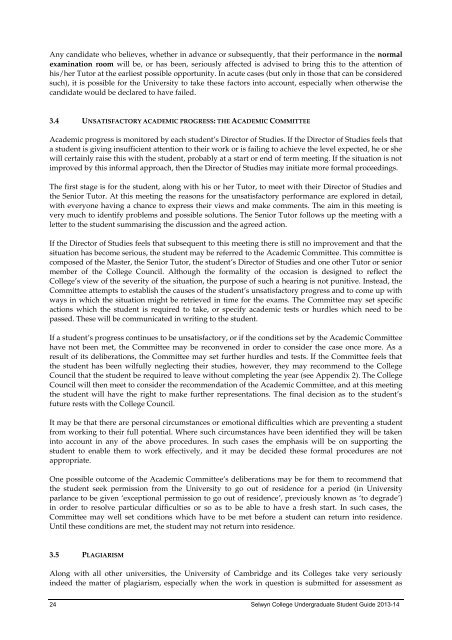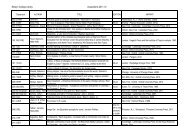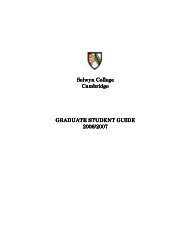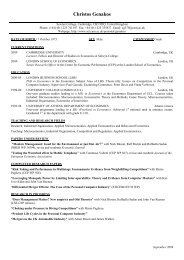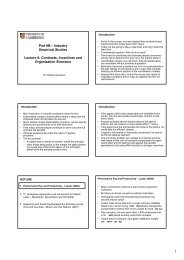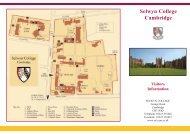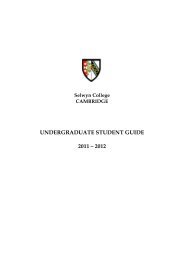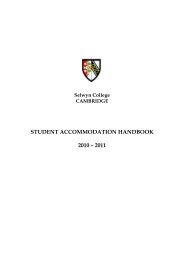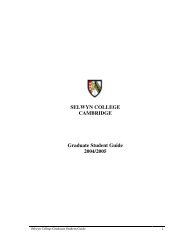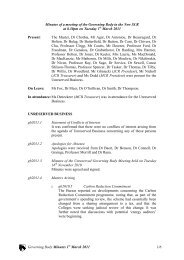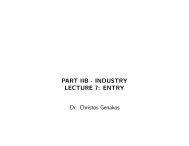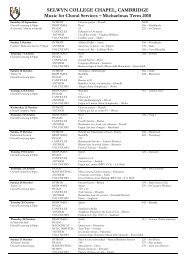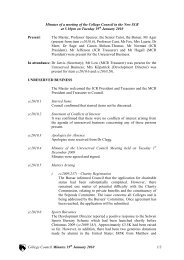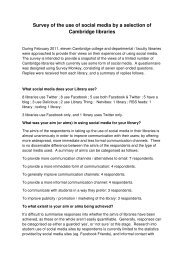Undergraduate Student Guide 2012-2013 - Selwyn College ...
Undergraduate Student Guide 2012-2013 - Selwyn College ...
Undergraduate Student Guide 2012-2013 - Selwyn College ...
You also want an ePaper? Increase the reach of your titles
YUMPU automatically turns print PDFs into web optimized ePapers that Google loves.
Any candidate who believes, whether in advance or subsequently, that their performance in the normal<br />
examination room will be, or has been, seriously affected is advised to bring this to the attention of<br />
his/her Tutor at the earliest possible opportunity. In acute cases (but only in those that can be considered<br />
such), it is possible for the University to take these factors into account, especially when otherwise the<br />
candidate would be declared to have failed.<br />
3.4 UNSATISFACTORY ACADEMIC PROGRESS: THE ACADEMIC COMMITTEE<br />
Academic progress is monitored by each student’s Director of Studies. If the Director of Studies feels that<br />
a student is giving insufficient attention to their work or is failing to achieve the level expected, he or she<br />
will certainly raise this with the student, probably at a start or end of term meeting. If the situation is not<br />
improved by this informal approach, then the Director of Studies may initiate more formal proceedings.<br />
The first stage is for the student, along with his or her Tutor, to meet with their Director of Studies and<br />
the Senior Tutor. At this meeting the reasons for the unsatisfactory performance are explored in detail,<br />
with everyone having a chance to express their views and make comments. The aim in this meeting is<br />
very much to identify problems and possible solutions. The Senior Tutor follows up the meeting with a<br />
letter to the student summarising the discussion and the agreed action.<br />
If the Director of Studies feels that subsequent to this meeting there is still no improvement and that the<br />
situation has become serious, the student may be referred to the Academic Committee. This committee is<br />
composed of the Master, the Senior Tutor, the student’s Director of Studies and one other Tutor or senior<br />
member of the <strong>College</strong> Council. Although the formality of the occasion is designed to reflect the<br />
<strong>College</strong>’s view of the severity of the situation, the purpose of such a hearing is not punitive. Instead, the<br />
Committee attempts to establish the causes of the student’s unsatisfactory progress and to come up with<br />
ways in which the situation might be retrieved in time for the exams. The Committee may set specific<br />
actions which the student is required to take, or specify academic tests or hurdles which need to be<br />
passed. These will be communicated in writing to the student.<br />
If a student’s progress continues to be unsatisfactory, or if the conditions set by the Academic Committee<br />
have not been met, the Committee may be reconvened in order to consider the case once more. As a<br />
result of its deliberations, the Committee may set further hurdles and tests. If the Committee feels that<br />
the student has been wilfully neglecting their studies, however, they may recommend to the <strong>College</strong><br />
Council that the student be required to leave without completing the year (see Appendix 2). The <strong>College</strong><br />
Council will then meet to consider the recommendation of the Academic Committee, and at this meeting<br />
the student will have the right to make further representations. The final decision as to the student’s<br />
future rests with the <strong>College</strong> Council.<br />
It may be that there are personal circumstances or emotional difficulties which are preventing a student<br />
from working to their full potential. Where such circumstances have been identified they will be taken<br />
into account in any of the above procedures. In such cases the emphasis will be on supporting the<br />
student to enable them to work effectively, and it may be decided these formal procedures are not<br />
appropriate.<br />
One possible outcome of the Academic Committee’s deliberations may be for them to recommend that<br />
the student seek permission from the University to go out of residence for a period (in University<br />
parlance to be given ‘exceptional permission to go out of residence’, previously known as ‘to degrade’)<br />
in order to resolve particular difficulties or so as to be able to have a fresh start. In such cases, the<br />
Committee may well set conditions which have to be met before a student can return into residence.<br />
Until these conditions are met, the student may not return into residence.<br />
3.5 PLAGIARISM<br />
Along with all other universities, the University of Cambridge and its <strong>College</strong>s take very seriously<br />
indeed the matter of plagiarism, especially when the work in question is submitted for assessment as<br />
24 <strong>Selwyn</strong> <strong>College</strong> <strong>Undergraduate</strong> <strong>Student</strong> <strong>Guide</strong> <strong>2013</strong>-14


